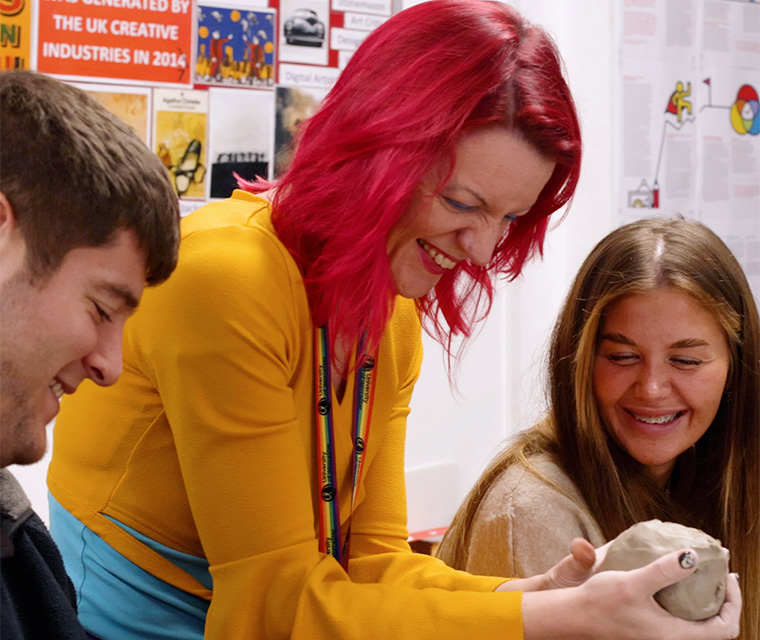You can explore a specific research question that interests you whilst benefiting from structured support in quantitative or qualitative research, and a blend of cohort and personalised expert supervision.
in the UK for Quality Education
in the UK for sustained employment and/or further study
First for jobs
The University of Worcester is first in the UK for sustained employment, further study or both, five years after graduation (excluding specialist institutions) - Longitudinal Educational Outcomes Survey 2024. Read more.
Overview
Whether your chosen topic is teacher education, educational systems, pupil voice, educational leadership or history of education and whether you focus in on Early Years education, compulsory education, further or higher education, you will be supported by experts in our Institute of Education to deliver a significant piece of research with the potential to impact on educational practice in your chosen area.
The course can be a route into further research - many of our MRes students have progressed to undertake a PhD and some from there into academic jobs. However, it also provides you with a contemporary knowledge of issues and challenges in educational theory and practice and a rich portfolio of transferable skills – project management, critical and creative thinking, problem solving – which will be invaluable in a career as a teacher or an educational leader or manager.
We expect applicants to submit a project outline at the point of application which identifies the research question or problem that your project will address and why this is important to you, engages with what other researchers have written about this question/problem and explains why this research is needed, and sketches out how you will do the research: what data you will need to collect and how you will collect it. This proposal will enable us to identify the right person to supervise your project, your Director of Studies. We can offer supervisory expertise in the following areas:
- Early Childhood
- Leadership & Management
- Mentoring & Coaching
- Pupil voice
- Religious Education
- Special Education Needs
- Teacher identity and retention
- Psychology of Education
- Social Pedagogy
- Inclusive Education
- Social Justice of Education
Course structure
The course begins with a taught component during which you will receive a strong grounding in project planning and management, develop advanced knowledge of the research skills and methods you will need to complete your planned project, and enhance your knowledge of contemporary trends and issues in educational theory and practice. During this stage you will develop your project outline into a full project proposal. Throughout the taught component you will receive support from your appointed Director of Studies
You will then progress to the research component of the course during which you will undertake the project that you have designed. Throughout your project your Director of Studies will guide and support you, advising at every step to ensure you achieve the best research outcomes.
Across the programme, you will be able to engage with our Doctoral School’s Research Student Development Programme which offers a range of workshops and micro-courses, online and in-person, for our MRes and PhD students on a diverse range of topics, from masterclasses on specific research methods or analysis techniques, courses to improve your dissemination skills – whether presenting at a conference or writing for publication - and enhance the impact of your research.
Course content
Our courses are informed by research and current developments in the discipline and by feedback from students, external examiners and employers. Modules do therefore change periodically in the interests of keeping the course relevant and reflecting best practice. The most up-to-date information will be available to you once you have accepted a place and registered for the course. If there are insufficient numbers of students interested in an optional module, this might not be offered, but we will advise you as soon as possible and help you choose an alternative.
Careers
An MRes can be a stepping stone to further study at doctoral level. Students who complete a Masters by Research will often go on to undertake a PhD or a professional doctorate such as a Doctorate of Education. This can lead to a role as a lecturer or researcher in the Higher Education sector or as a researcher in the public or business sectors. The transferable skills developed though the MRes will also prepare you for careers in the education, business and public sectors and will fast-track you into leadership and management roles.
The 2022 publication What do researchers do?, based on Graduate Outcome data, shows the clear benefits of completing a research degree with research degree graduates having significantly better employment outcomes than contemporary graduates with only first or taught masters degrees. The report also highlight that two thirds of research degree graduates go on to work in the HE sector with the remaining third working in other areas such as teaching and management.
Course highlights
Teaching and supervision
The taught programme is delivered through a combination of lectures, interactive workshops, seminars, and online micro-courses. Lectures will introduce you to key topics in Education research. Interactive workshops take a variety of formats and are intended to enable the development and application of learning through discussion and small group activities. Seminars enable the discussion and development of understanding of topics introduced in lectures. Online micro-courses will explore key themes in research planning and management and test your knowledge of these themes through short quizzes.
The University places great emphasis on enabling students to develop the independent learning capabilities that will equip you for lifelong learning and future employment, as well as for academic achievement. During the research project module you will work independently for most of the time under the supervision of your Director of Studies. They will meet with you regularly to guide your learning and provide feedback on your work.
Teaching and assessment contents
The course provides opportunities to test understanding and learning informally through the completion of practice or ‘formative’ assessments.
Each taught module has one or more formal or ‘summative’ assessments which are graded and count towards the overall module grade. Assessment methods are through coursework including presentations, literature reviews, project proposals, project plans.
For the research project module you will submit a 20,000 word thesis. Your Director of Studies will provide feedback on drafts chapters and a final draft of your thesis.
You will receive feedback on practice assessments and on formal assessments. Feedback is intended to support learning and you are encouraged to discuss it with your module tutors and Director of Studies as appropriate.
We will provide you with feedback on formal course work assessments within 20 working days of hand-in.
Entry requirements
- First or Upper Second Class Honours Degree or an approved equivalent award in a relevant discipline
or
- Research or professional experience which has resulted in appropriate evidence of achievement
International applicants will be required to demonstrate comparable prior subject experience and to have an appropriate level of written and spoken English (normally an IELTS score of 6.5 with a minimum score of 6 in written English).
Entry qualifications for international students are guided by the National Academic Recognition Information Centre's (NARIC) advice on international qualifications.
Any questions?
If you have any questions about entry requirements, please call our Admissions Office on 01905 855111 or email admissions@worc.ac.uk.
Fees
Fees contents
UK and EU Students - Indicative fee
The standard fee for full-time home and EU students enrolling on MA/MSc/MBA and MRes degrees in the 2025/26 academic year is £9,450 per year.
For more details, please visit our course fees page.
International Students - Indicative fee
The standard tuition fee for full-time international students enrolling on MA, MSc, MBA and MRes degrees in the 2025/26 academic year is £17,900 per year.
How to apply
How to apply contents
Apply to study
Please make your application via our online application forms.
If you have any questions, please contact the Admissions office on 01905 855111 or admissions@worc.ac.uk
Research outline
As part of the application process you are asked to present an outline of your proposed research project. Please read these notes for guidance as you prepare your outline.
Contact
If you have any questions, please get in touch. We're here to help you every step of the way.
Admissions Office
admissions@worc.ac.uk01905 855111More to explore
Open Days
Visiting us is the best way to get a feel for student life at the University of Worcester.

The City of Worcester
Worcester is a welcoming university city with great transport links and plenty of student parking.

Accommodation
Benefit from our accommodation guarantee. We have rooms on campus to suit every budget including en-suite options.




